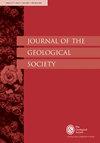蛇绿铬铁矿中两辉石共生出溶结构:对阿尔巴尼亚Mirdita蛇绿岩深部地幔成因的启示
IF 3
3区 地球科学
Q2 GEOSCIENCES, MULTIDISCIPLINARY
引用次数: 0
摘要
蛇绿岩中足状铬铁矿越来越多的矿物学和结构证据表明它们的超高压起源(>150 km),挑战了它们在低压条件下形成的传统模型(<60千米)的上地幔。然而,由于缺乏原位矿物学证据,这一挑战仍然存在争议。在这里,我们报告了来自阿尔巴尼亚Mirdita蛇绿岩的Skenderbeu地块的新数据和观测结果。透射电镜(TEM)分析首次发现这些铬铁矿(cr# = 41.8 ~ 43.2)具有大量的透辉斜辉石和正长辉石的脱溶层。TEM分析还表明,这些片状物与寄主铬铁矿具有晶体拓扑关系,即(020)Cpx∥︀(22(-)0)Chr, (2(-)00) Cpx∥︀(111)Chr, (010) Opx∥︀(22(-)0)Chr, (200) Opx∥︀(22(-)0)Chr,表明其为出溶源。寄主铬铁矿中心大量辉石析出片表明前体铬铁矿中存在Si 4+和Ca 2+阳离子,这是一个稳定的>12.5 GPa(即380 km深)的CaFe 2o结构高压多晶体。这些原位、纳米尺度的观测和地质分布,以及先前在Mirdita蛇绿岩中发现的蛇绿岩钻石,表明蛇绿岩铬铁矿的起源比传统解释要深得多,并为了解深部地幔的组成提供了宝贵的机会。专题收藏:这篇文章是蛇绿岩、杂色岩和蓝片岩收藏的一部分,可在https://www.lyellcollection.org/topic/collections/ophiolites-melanges-and-blueschists上找到本文章由计算机程序翻译,如有差异,请以英文原文为准。
Two-pyroxene, intergrowth exsolution textures in ophiolitic chromites: implications for the deep mantle origin of the Mirdita Ophiolite, Albania
Increasing mineralogical and textural evidence from podiform chromitites in ophiolites show their ultra–high pressure origin (>150 km), challenging the conventional models for their formation under low pressure conditions (< 60 km) in the upper mantle. However, this challenge remains controversial due to the lack of in-situ mineralogical evidence. Here, we report new data and observations from the Skenderbeu massif in Mirdita ophiolite, Albania. Transmission electron microscopy (TEM) analysis reveal for the first time that these chromitites (Cr#= 41.8-43.2) have numerous exsolution lamellae of diopsidic clinopyroxene and orthoenstatite. TEM analysis also show that these lamellae have a crystallographic topotaxy relationship with the host chromite, i.e., (020) Cpx ∥︀ (22(—)0) Chr , (2(—)00) Cpx ∥︀ (111) Chr , and (010) Opx ∥︀ (22(—)0) Chr , (200) Opx ∥︀ (22(—)0) Chr , indicating an exsolution origin. The abundant presence of pyroxene exsolution lamellae in center of the host chromites implies the incorporation of Si 4+ and Ca 2+ cations in the precursor chromite, a CaFe 2 O 4 -structured high-pressure polymorph, which was stable >12.5 GPa (i.e., 380 km deep). These in-situ, nano-scale observations, and geological occurrence, together with previously discovered ophiolitic diamonds in the Mirdita ophiolite, suggest a much deeper origin for ophiolitic chromitites than conventional interpretations, and provide a valuable opportunity to understand the composition of the deep mantle. Thematic collection: This article is part of the Ophiolites, melanges and blueschists collection available at: https://www.lyellcollection.org/topic/collections/ophiolites-melanges-and-blueschists
求助全文
通过发布文献求助,成功后即可免费获取论文全文。
去求助
来源期刊

Journal of the Geological Society
地学-地球科学综合
CiteScore
6.00
自引率
3.70%
发文量
68
审稿时长
6-12 weeks
期刊介绍:
Journal of the Geological Society (JGS) is owned and published by the Geological Society of London.
JGS publishes topical, high-quality recent research across the full range of Earth Sciences. Papers are interdisciplinary in nature and emphasize the development of an understanding of fundamental geological processes. Broad interest articles that refer to regional studies, but which extend beyond their geographical context are also welcomed.
Each year JGS presents the ‘JGS Early Career Award'' for papers published in the journal, which rewards the writing of well-written, exciting papers from early career geologists.
The journal publishes research and invited review articles, discussion papers and thematic sets.
 求助内容:
求助内容: 应助结果提醒方式:
应助结果提醒方式:


